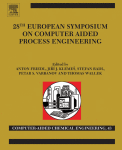 Authors: Linsey KOO, Edlira KALEMI, Nikolaos TROKANAS, Franjo CECELJA
Authors: Linsey KOO, Edlira KALEMI, Nikolaos TROKANAS, Franjo CECELJA
Affiliation: University of Surrey, Guildford, GU2 7XH, GB
Reference: Koo, L., Kalemi, E., Trokanas, N., & Cecelja, F. (2018). Ontology engineering approach to support process of model integration. In Computer Aided Chemical Engineering (Vol. 43, pp. 563–564). Elsevier B.V.
Abstract: “Process modelling and simulation is a vital tool to plan, evaluate, assess, and develop different alternatives for the design of products and processes. The complexity of problems as well as heterogeneity of modelling methods make process modelling and simulation challenging, time consuming and often tedious process requiring a wide range of expertise. Inconsistencies in model development are the main cause for redundant work. Models remain implicit to the engineers who have built them, which further limits the potential of reusability. The only model integration framework in use, the CAPE-OPEN, addresses the issue of standardisation of interfaces to enable interoperability between simulator software components from different sources….”
DOI: 10.1016/B978-0-444-64235-6.50100-5
Comments: the authors state that the only model integration framework in use is CAPE-OPEN. However CAPE-OPEN is “just” a software integration framework, aiming at interoperability between software tools used in process simulation and modelling. CAPE-OPEN is not describing the models themselves, within unit operations or thermodynamic servers. CAPE-OPEN is not a model integration framework.
So, when the authors mention that “the shortcoming of the CAPE-OPEN is in the need for identifying key variables for each unit operation”, they are misinterpreting what CAPE-OPEN is for. Early on it was recognized, with the COGents European-funded project, that ontologies were a solution to better identify what a model was for, what were its prerequisites, etc… CAPE-OPEN is the technology enabling different types of models embedded in software tools to interoperate. Without CAPE-OPEN being supported by the software components in which models are implemented, the mix and match of models, based on metadata describing their capabilities, will not lead to these models communicating within any process simulator which is not specific to these models.
